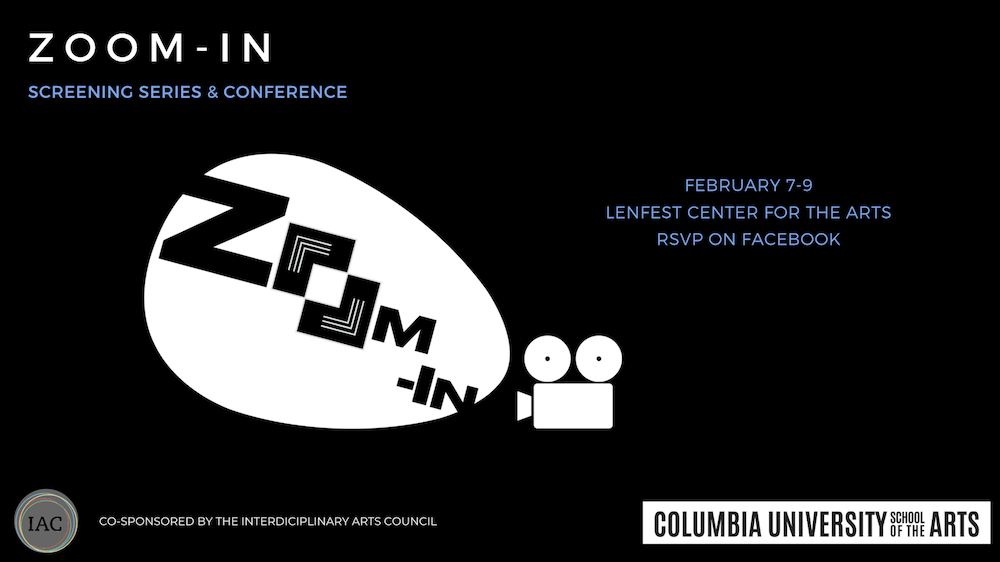Zoom-In 2020: A New Hybrid Thesis Showcase Hosted by Columbia Film and Media Studies Students
We live in a divisive world where we are constantly asked to define and redefine who we are. Cultural boundaries are dissolving as new walls are being erected. Our identities have become both diverse and fragmented with the advent of new forms of media. And often, we forget the immense impact media, especially film, has on culture and identity. We rush from one thing to another with our minds overwhelmed by the constant barrage of information, knowledge and stimuli but on rare occasions, we are asked to slow down, sit down, and share ideas and thoughts. Zoom-In, hosted by Film and Media Studies candidates last week, asked us to do just that.
Zoom-In was started by Film and Media Studies professors Jane Gaines and Ron Gregg two years ago. It began as a screening series, but this year, became more of a hybrid as it was dubbed a screening series and thesis showcase. “The screening series is intended to honor the films at the center of student theses but we incorporated presentations and post-screening discussions in the third annual Zoom-In to better represent our scholarship,” said Kyna McClenaghan ’20, one of the event’s organizers.
Students, professors, film organizations and communities attended the screenings of 16mm, 35mm, DCP, DVD, and Blu-Ray films in the beautiful Lenfest Center for the Arts. Artwork by Visual Arts students Lau Wai ’20, Kathryn Ann Miller ’20, and Raelis Vasque ’21 greeted visitors as they walked into the lobby and was on display throughout the weekend. At the sign-in desk, were viewfinders—sourced by Reem Alkabi ’20—with the Zoom-In logo and stills selected from films screening over the weekend.
McClenaghan organised the event alongside nineteen other graduate students, which included scheduling, communicating with the cohort about their work, coordinating jobs, maintaining all digital materials, and advertising. The event was organized in modules—of films and theses—that could elicit stimulating conversation. Students decided which theses might have some connections with their own and formulated the modules on this basis. The event began with an introduction by Professor Ron Gregg, which was followed by Module 1 titled Female Stardom. This module had films/topics that were paired because they were a natural fit and included screenings like the 1915 film A Fool There Was (dir. Frank Powell) and promotional reel for Hands Up! (dir. James W. Hawthorne, 1918). Later in the day, Mulan Joins the Army (dir. Wancang Bu, 1939) had its US premiere with english subtitles as part of Module 2.
Day two started on a revolutionary note, with the first Module discussing the revolutionary tactics from Arab Spring to Hong Kong. Alkabi investigated the ‘Antigone figure’ in Arab Cinema in her thesis with the screening of Amal (dir. Mohamed Siam, 2017), which was followed by the screening of a student documentary film—a first in the series—Be Water directed by Cherie Chan ’20. While other Modules included films that seemed unconnected at first but had surprising thematic commonalities. Module 5 included a presentation by Karlee Rodrigues ’20, titled “Hollywood Blockbusters in Portugese Folklore Festivals,'' where she explored the role of Hollywood in shaping Portugese cultural identity. Selva Trágica (dir. Roberto Farias, 1963) had its first US premiere, as part of William Plotnick ’20’s thesis focusing on the Cinema Novo movement in Brazil. There was also a rare US screening of Penda’s Fen. (dir. Alan Clarke, 1974), Fernand Deligny: About a Film to Be Made/À propos d’un film à faire (Renaud Victor, 1989) had its US premiere on the third day.
The screening series and thesis showcase included film screenings, presentations, introductions, post-screening dialogues, and Q&As. It was also an interdisciplinary showcase, with participation from other students in the School of the Arts and Columbia University. Columbia College student, Gavin Goodrich, played live piano accompaniment for all of Module 1, which consisted of silent films, and poetry student, Nada Faris, read a poem as part of Module 4.
Sean Anthony Chia ’21, who attended the event had this to say: “In exploring global connectivity and a deeper cultural influence of the films, festivals, and genres the students studied, Zoom-In reminded me how lucky I am to be walking the same halls as these bright students. I am leaving with the passion to create more authentic and culturally specific art.” Zoom-In has grown into a festival where people can sit and watch films in a community fashion, not unlike a film festival, and the students not only represented their thesis work but also engaged the visitors in a conversation with themselves and their work.
Zoom-In’s website will launch later this year, a place where visitors can view the program, trailer, and videos of talks. The site will serve as an archive for all Zoom-In annual events. One can also find the Zoom-In playlist on Spotify.
